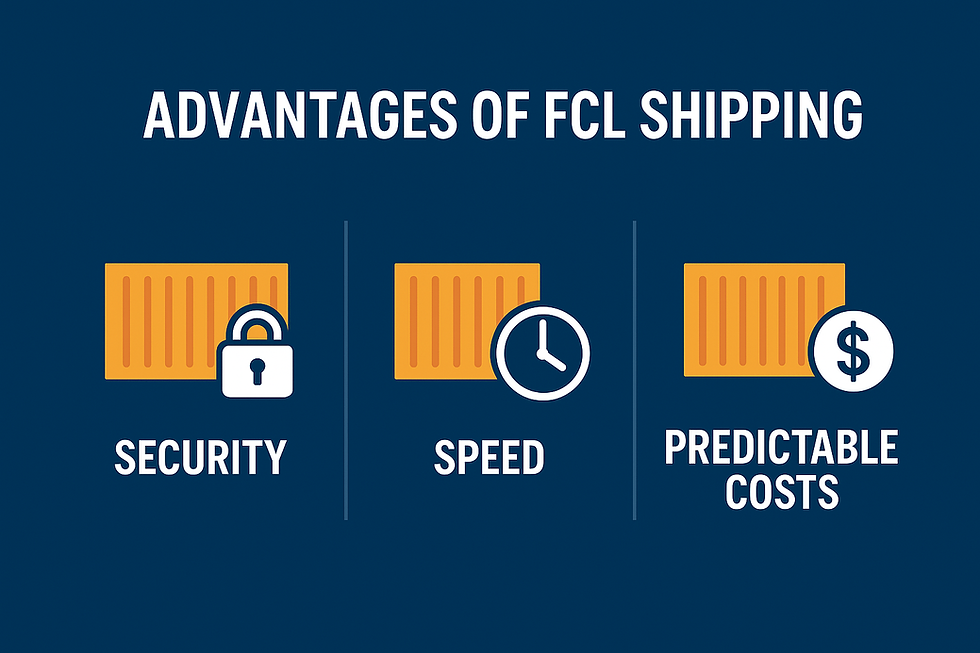Sea Shipping to Africa: Essential Tips for Exporters and Importers
- Sudipta Banik
- Dec 14, 2024
- 4 min read
Updated: Dec 17, 2024

Africa is a continent brimming with trade opportunities, and sea shipping remains one of the most cost-effective and reliable ways to transport goods. Whether you’re an experienced exporter or new to the global trade landscape, understanding the nuances of sea shipping to Africa is critical to ensure smooth operations and avoid costly errors. This guide provides practical insights and actionable tips to help exporters and importers navigate the complexities of this shipping route efficiently.
Why Sea Shipping to Africa is a Popular Choice
Sea shipping is the backbone of global trade, and Africa is no exception. With its vast coastline and growing economies, the continent offers numerous ports that facilitate international commerce. Compared to air freight, sea shipping is more economical for bulk shipments, making it a preferred choice for industries like manufacturing, agriculture, and retail. Furthermore, the expansion of logistics and freight companies in Africa has streamlined operations, improving connectivity and infrastructure.
Key Considerations Before Shipping Goods to Africa
Before initiating a shipment to Africa, it’s crucial to understand the prerequisites to ensure successful delivery. Here are the most important factors to consider:
1. Know Your Destination Ports
Africa boasts several major ports, including Durban (South Africa), Mombasa (Kenya), Lagos (Nigeria), and Tema (Ghana). Each port has unique advantages, capacity, and connectivity. Researching these ports and their capabilities will help you identify the most suitable destination for your shipment.
2. Understand Local Regulations and Tariffs
Each African country has its own customs regulations, tariffs, and import duties. Being aware of these rules will help you avoid unexpected costs and delays. Collaborate with a logistics and freight company in Africa that has expertise in navigating local regulatory landscapes.
3. Choose the Right Shipping Partner
Selecting a reliable bulk shipping agency in the USA is critical for a seamless process. Look for agencies with extensive experience in sea shipping to Africa and positive customer reviews. A good shipping partner will provide end-to-end solutions, including customs clearance and real-time tracking.
4. Packaging and Labeling Requirements
Proper packaging ensures that your goods arrive at their destination intact. Invest in high-quality materials that can withstand the rigors of long sea journeys. Additionally, ensure all labeling complies with international shipping standards, including clear details about the contents and destination.

Streamlining the Shipping Process
Efficient sea shipping to Africa requires careful planning and execution. Here are some tips to streamline the process:
1. Plan Your Shipment Early
Shipping by sea can take several weeks, depending on the distance and port schedules. Planning your shipment well in advance will help you avoid last-minute delays and increased costs during peak seasons.
2. Optimize Your Cargo for Bulk Shipping
Bulk shipping is ideal for large quantities of goods. Work with a bulk shipping agency in the USA to optimize your cargo—grouping items effectively to maximize container usage and reduce costs.
3. Ensure Accurate Documentation
Missing or inaccurate documentation can lead to customs delays or penalties. Essential documents include:
Bill of Lading
Commercial Invoice
Packing List
Certificate of Origin
Any necessary permits or licenses
4. Leverage Technology for Tracking
Modern shipping solutions offer real-time tracking, providing visibility into your shipment’s location and status. This feature not only offers peace of mind but also helps you address potential issues proactively.
Challenges of Sea Shipping to Africa and How to Overcome Them
Despite its advantages, sea shipping to Africa comes with its challenges. Here are some common issues and ways to address them:
1. Port Congestion
Some African ports experience congestion due to high traffic or inadequate infrastructure. Mitigate this risk by selecting less congested ports or working with a logistics and freight company in Africa that has established networks and alternatives.
2. Customs Delays
Customs procedures can be lengthy if documentation is incomplete or inaccurate. Ensuring proper paperwork and working with experienced customs brokers will help expedite clearance.
3. Inconsistent Infrastructure
While some regions have state-of-the-art facilities, others may lack basic infrastructure. Partnering with a logistics expert familiar with the local terrain can help navigate these discrepancies.
4. Security Risks
Piracy and theft are concerns in some shipping routes. Choose a shipping agency that prioritizes security, uses insured carriers, and provides secure storage facilities.
Benefits of Partnering with the Right Freight and Logistics Company
Collaborating with a reputable logistics and freight company in Africa offers numerous advantages:
Expertise in Local Regulations: They handle compliance, ensuring your goods meet all requirements.
Cost Savings: Efficient route planning and container optimization reduce expenses.
Reliable Delivery: Proven track records ensure timely and safe delivery of goods.
Enhanced Visibility: Advanced tracking tools provide real-time updates on your shipment.

Tips for Importers: Receiving Goods from Africa
Importing goods from Africa also requires careful planning. Here’s how to streamline the process:
1. Establish Strong Supplier Relationships
Work with reliable suppliers who understand export requirements and can provide consistent quality.
2. Factor in Lead Times
Sea freight from Africa to the USA takes time. Build flexibility into your supply chain to account for shipping durations and potential delays.
3. Verify Compliance Standards
Ensure that imported goods meet U.S. compliance standards, including product quality and labeling requirements.
Conclusion
Sea shipping to Africa presents immense opportunities for businesses looking to tap into the continent’s dynamic markets. By understanding the nuances of shipping routes, regulatory frameworks, and logistical challenges, exporters and importers can ensure smooth operations and cost efficiency. Partnering with a reliable bulk shipping agency in the USA and leveraging the expertise of a logistics and freight company in Africa can significantly simplify the process. With careful planning and the right strategies, your shipments can seamlessly connect continents and foster successful trade relationships.












Comments